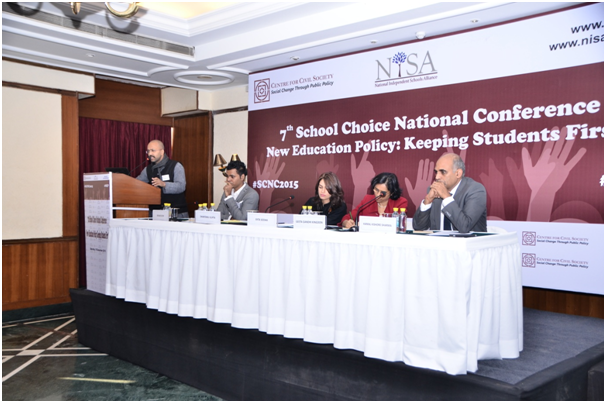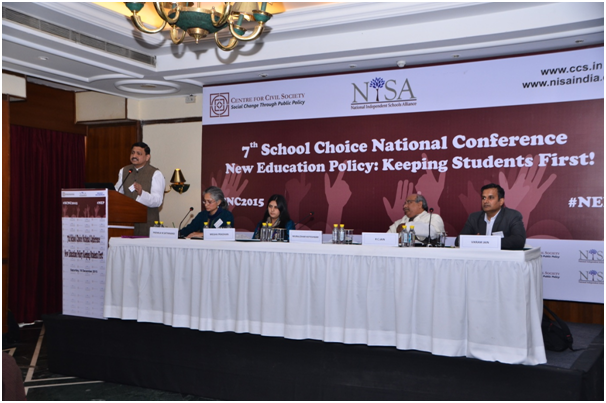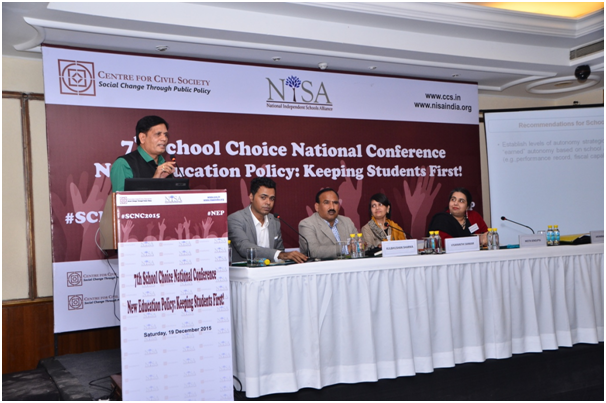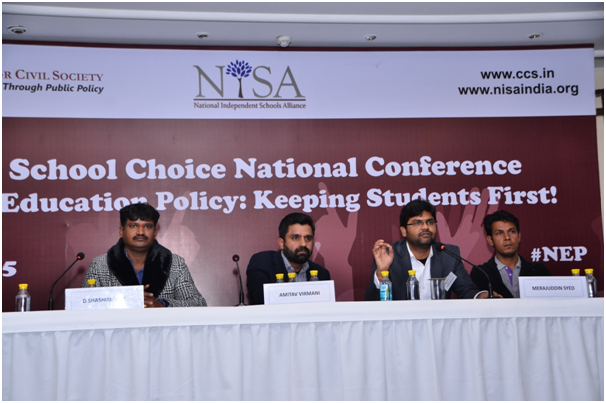7th School Choice National Conference 2015
New Education Policy: Keep Students First!
19 December 2015, New Delhi: India is gearing up for its New Education Policy(NEP) after 23 years since country’s education policy was last reviewed. A lot has changed during this period in terms of status and social and economic context of school education in India. In recent years discourse on quality of education along with access and equity of education has gathered momentum, particularly after reports such as ASER, 2014 and NAS 2014 brought learning crisis of sorts to our notice. In light of this, the 7th School Choice National Conference of 2015 organized by Centre for Civil Society (CCS) & National Independent Schools Alliance (NISA) aimed to discuss important contemporary issues in education such as Learning Outcomes, Right to Education or Right to Learning and School Autonomy and make some concrete recommendations for the New Education Policy.
The objective of the upcoming NEP therefore is to meet the changing needs of quality education, innovation and research. In this context, the 2015 School Choice National Conference was dedicated to debating and merits and proposing improvements to the New Education Policy.
The conference had four Panel Discussions:
Read Detailed report here.
The Recommendations from SCNC 2015 for NEP that came out of the conference as recommendations to be incorporated in New Education Policy are:
- Fund Students, Not Schools - Government funding in education needs to take a new approach in which unit of funds allocation and spending is a “child” and not “schools”. Currently government while making budgets calculates costs per child but while allocating and spending budgets, funds are routed through institutions such as Education Department, Schools.
- Third Party Assessments - Third Party assessments can be described as a Health Check-Up of the education system. They hold a potential to provide clues for multiple non-performing and performing factors within the system.
- Outcomes Based Regulation - We must introduce a system of regulation where learning outcomes becomes the key factor in regulation of schools, both government and private. RTE Rules of Gujarat is one model where school recognition and regulation are both driven by learning outcomes.
- Autonomy (Principals as leaders) - It is important that school principals and teachers are given greater decision making powers and control over resources such as school finances to be able to innovate and improve their schools and classrooms respectively. Principals in particular should become leaders of their schools and play a pivotal role defining and driving quality of education in their schools.
- Choice to be profit or non-profit - It is mandatory for schools to be a non-profit entity in India. It is important to start considering education as an important component of service industry similar to health, telecom and electricity where entry of for-profit entities has immensely benefitted the sector in terms of both access and quality of services enjoyed by common citizens.
- Governance model: separate regulation, finance and delivery - Currently government plays a role of regulator, financer and provider of education all at the same time. Some of the key challenges with this structure are: lack of independent and neutral monitoring of government and private schools, favorable treatment to the government schools, lack of accountability in financing education.
- Education Data in Public Domain - Education data in India is collected by central agencies (at state and / or state level) periodically. While the data quite often is made available in public domain, the time lapse between data collection and publishing the data poses serious challenges in terms of validity and utility of the data.
- Technological Innovation in pedagogy and evaluation - Current policy for use of technology in education largely looks at technology as an innovative teaching and learning tool. Technology in education has gone much beyond classrooms and gamification to include other areas such as teacher training and certification, school management, assessments, tracking of students etc.
Media coverage:
- Dainik Bhaskar, 20 December 2015: दो-दो अध्यापकों के भरोसे चल रहे हैं एक लाख सरकारी स्कूल (http://ccs.in)
- Hindustan, 20 December 2015: निजी स्कूलों की आवाज सुनी जाए (http://ccs.in)
- National Dunia, 20 December 2015: सरकारी स्कूलों में अध्यापकों की कमी पर व्यक्त की गई चिंता (http://ccs.in)
- Navodaya Times, 20 December 2015: दो-दो अध्यापकों के भरोसे 1 लाख सरकारी स्कूल (http://ccs.in)
- Rashtriya Sahara, 20 December 2015: स्कूलों में छात्रों की संख्या घटने से संचालन खर्च बढ़ा (http://ccs.in)
- NITI Central, December 21, 2015: School Choice National Conference (http://ccs.in)
- NewsGram, December 20, 2015: Need a revolution in Indian education system (http://ccs.in)
- NewsGram, December 19, 2015: Can’t recommend higher education in Indian languages (http://ccs.in)
Catch glimpse of School Choice National Conference (SCNC) 2015 on Facebook here.
The conference was live-streamed and available on YouTube here.
The proceedings of the conference will be compiled and shared on conference microsite here.
You can find what all people talked about the conference on Twitter by searching with #SCNC2015





